Your Stroke Care Journey
June 06, 2023
The Huron Perth District Stroke Program is a part of the Southwestern Ontario Stroke Network (SWOSN). Eleven stroke networks in Ontario provide leadership and planning to support stroke best practices across the care continuum.
Evidence demonstrates that stroke survivors have the best outcomes when they are cared for in a system that is organized and coordinated. As part of the Huron Perth District Stroke Program - HPHA's Stratford General Hospital is one of seven hospitals in the South West region that provides acute and rehabilitation services.
Stroke is a major life event for you and those close to you. The common goal for everyone is your recovery. When you have a stroke, a team of health care providers works with you, your family and caregivers to help you recover from or adapt to the changes caused by the stroke. This team will also teach you about stroke, its effects and strategies to use in daily life.
Let's take a look at the members of the health care team who provide stroke care at HPHA and in your community! It is important to note that you may not interact with every team member listed. Every stroke and every stroke recovery journey is unique.
Primary Care Practitioners (family doctor or nurse practitioner) are integral in providing education and monitoring your health status to identify and mitigate risk factors. If you are showing signs and symptoms consistent with a Transient Ischemic Attack (TIA) or stroke, your Primary Care Practitioner may make a referral to the Secondary Stroke Prevention Clinic.
The Stroke Prevention Clinic (SPC) provides rapid access to experts, diagnostic tests and treatments if you have had, or are at risk of having, signs and symptoms of a recent stroke or Transient Ischemic Attack (TIA). Louise and Caroline are registered nurses who coordinate care with support from Cindy, the administrative assistant for the SPC and CSRT. If you meet SPC criteria you will attend a variety of tests. A physician reviews test results and recommends treatment. Louise and Caroline support education on risk factor modification. Referrals to other service providers are initiated, as appropriate.
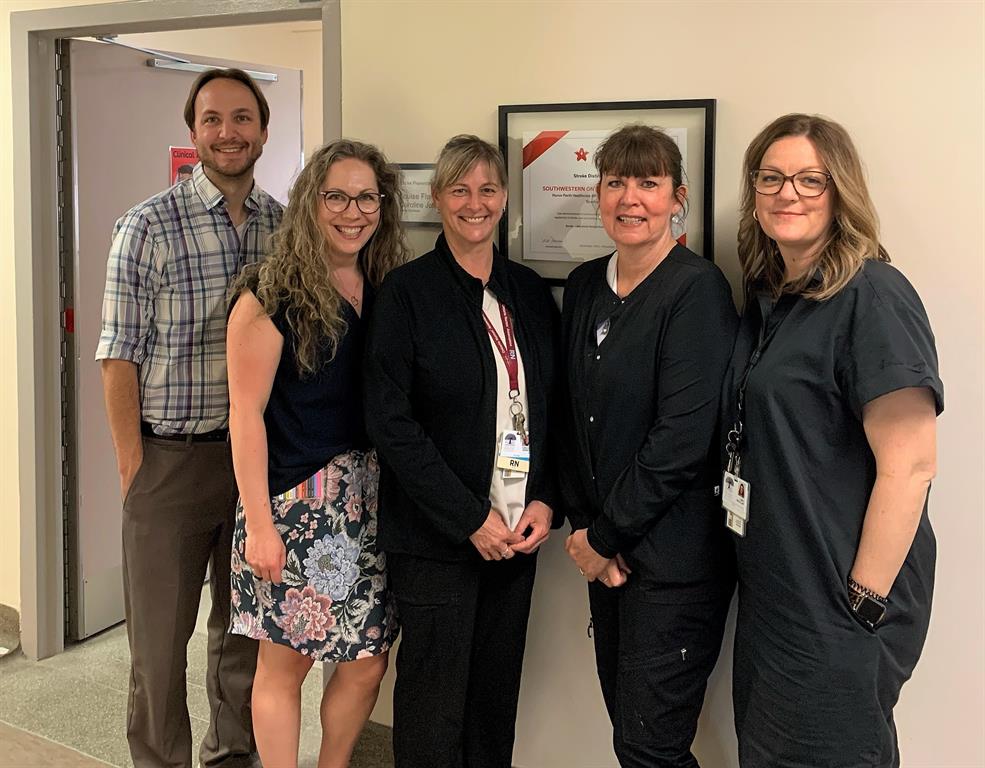
Stroke Prevention Clinic L to R: Dr. Peirce, Co-Medical Program Director, Medicine Stroke Lead; Joanna, Huron Perth District Stroke Manager; Caroline, RN, Stroke Strategy Nurse; Louise, RN, Stroke Strategy Nurse; Cindy, Administrative Assistant
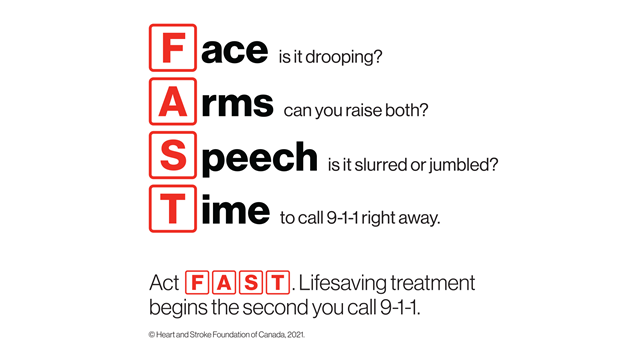
If you are experiencing the signs and symptoms of a stroke you are encouraged to CALL 9-1-1. Do not drive! Emergency Medical Service (EMS) providers are trained to initiate treatment on route to the hospital. This includes identifying the closest stroke centre and notifying the hospital of their estimated time of arrival.
Upon your arrival at the Designated Stroke Centre, Emergency Department nurses start your in-hospital assessment. Rapid brain imaging and blood tests require coordinated efforts amongst multiple different team members and departments!
Time is brain. Every second counts. The Internal Medicine Physician uses the assessment findings to determine treatment options. You may be appropriate for thrombolytic therapy (tPA) to try to dissolve the clot and/or endovascular therapy (EVT) to mechanically remove the clot. EVT requires transfer to the Regional Stroke Centre at London Health Sciences Centre - University Hospital. The physician may utilize Telestroke, a service which provides 24/7 access to neurologists with expertise in stroke care who can virtually support assessment and treatment.
If you require an admission to Stratford General Hospital you will be transferred from the Emergency Department to either the Critical Care Unit (CCU) or Integrated Stroke Unit (ISU). Nurses and Personal Support Workers (PSWs) receive additional training to monitor neurological status and provide quality care that aligns with Canadian Stroke Best Practice Recommendations to manage the effects of stroke, such as dysphagia and hemiplegia.
The ISU is a combination of acute and rehabilitation beds. You remain in the same care environment throughout your inpatient stay; however, you will notice change to the structure of your day and an increase to the amount of time spent with the allied health practitioners, such as the physiotherapy team, when you transition to rehabilitation.
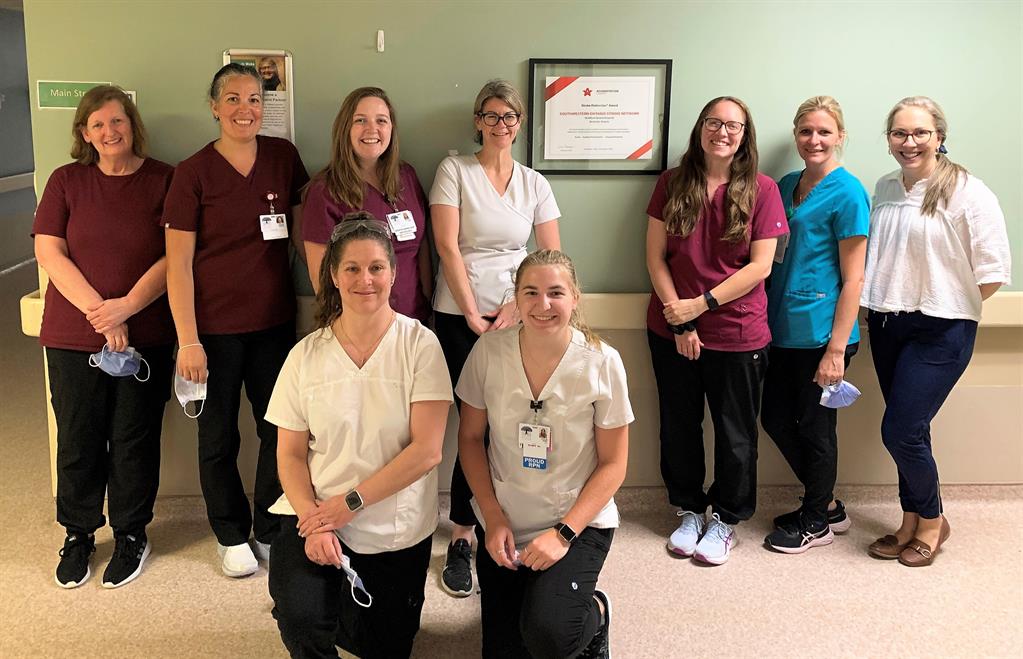
ISU Back Row L to R: Trish, Physiotherapist; Nadina, Occupational Therapist; Madison, Speech Language Pathologist; Colleen, RN Team Leader; Karly, Speech Language Pathologist; Melissa, PSW;
Joanna, Huron Perth District Stroke Manager
Front Row L to R: Polly, RPN and Kaylin, RPN
An interdisciplinary team of care providers will directly support you and your family/caregiver(s) throughout your recovery. Many additional support service providers, including the Stroke Peer Mentors, are essential to the successful provision of stroke care!
HPHA has the largest number of Stroke Peer Mentors in Partnership with March of Dimes Canada (MODC). This program connects volunteers who are stroke survivors with individuals who have recently survived a stroke in a hospital setting, providing a firsthand understanding of the effects that a stroke can have on psychological and physical health. These mentors use their experience to provide hope, encouragement and emotional support. By facilitating information and resources through informative, supportive conversations stroke survivors report becoming more hopeful about their recovery. The Stroke Peer Mentor receives relevant training from the MODC to be a positive role model for stroke recovery, through demonstrating how to resume life after a stroke. If you are interested in becoming a Stroke Peer Mentor you can contact Erin Bickell, Social Worker at erin.bickell@hpha.ca or at 519-272-8210 ext. 4288.
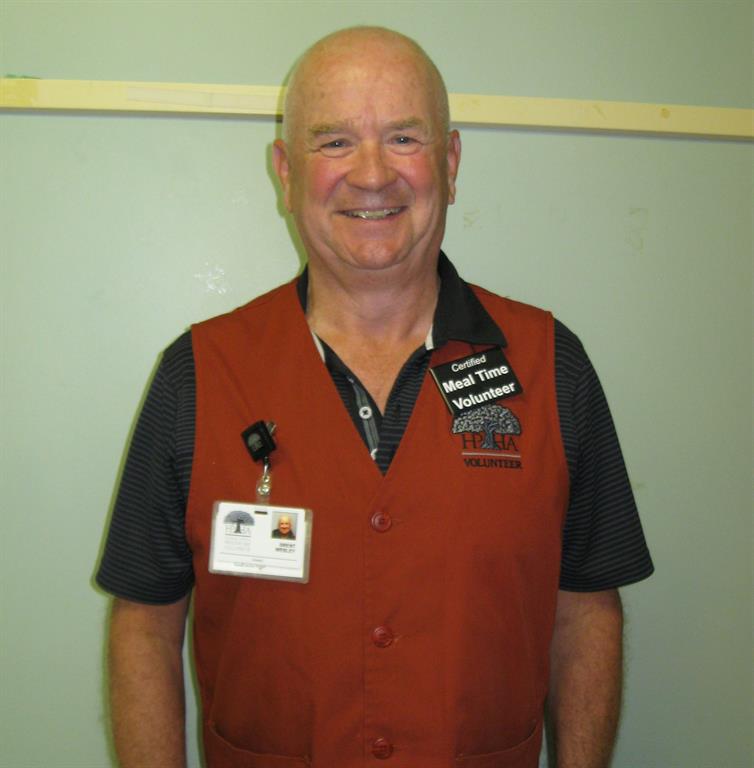
Brent, Stroke Peer Mentor
Rehabilitation continues in the community through the support of the Community Stroke Rehabilitation Team (CSRT). The team members identify what activities are most important to you and your family/caregiver(s). They work collaboratively amongst the team and with community service providers to ensure you receive the therapy, education and support you need to reintegrate into your community. They also make recommendations about healthy living to help reduce the chance of having another stroke or other serious health problem.
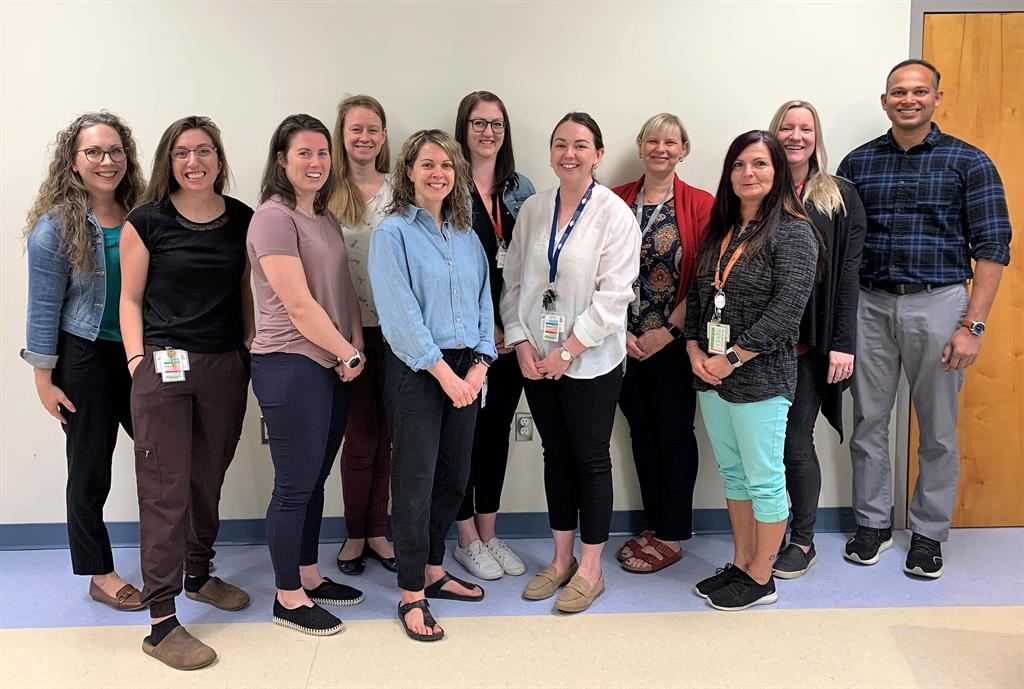
CSRT L to R: Joanna, Huron Perth District Stroke Manager; Roslyn, Occupational Therapist; Hannah, Rehabilitation Therapist; Megan, Speech Language Pathologist; Erin, Social Worker; Chelsea, Rehabilitation Therapist;
Kyle, Rehabilitation Therapist; Grace, Registered Nurse; Kelly, Recreation Therapist; Emily, Rehabilitation Therapist; Ajeesh, Physiotherapist
The team across the stroke continuum of care work independently, but alongside each other to coordinate services and achieve our collective goal providing excellence in stroke care.